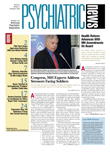Recession-fighting federal stimulus money allowed one-third of the states to expand their Medicaid programs in the last fiscal year, which produced the biggest nationwide boost in Medicaid enrollment in six years.
The growth in Medicaid spending—despite the biggest drop in state tax revenue in many years—was identified through an annual state survey released in September by the Kaiser Family Foundation's Commission on Medicaid and the Uninsured.
The survey reported state estimates that Medicaid enrollment grew by an average of 5.4 percent in Fiscal 2009, which surpassed the anticipated 3.6 percent increase the Kaiser researchers projected at the start of the fiscal year. Similarly, total Medicaid spending grew by an average 7.9 percent in Fiscal 2009, the highest rate in five years and well above the 5.8 percent projected growth.
The overall Medicaid enrollment growth could have a large impact on people with mental illness, because Medicaid now pays for over half of all publicly financed mental health services in the United States and more than 25 percent of all mental health services nationally.
Laurence Miller, M.D., chair of the APA Assembly's Committee on Public and Community Psychiatry, was not surprised that the number of enrollees in Medicaid has increased as unemployment rates soared. His comments to Psychiatric News echoed the findings of the Kaiser researchers that the growth was possible because of $87 billion in Medicaid matching grants provided by the American Recovery and Reinvestment Act, often referred to as the federal stimulus law.
However, states are facing the likelihood of future Medicaid cuts after federal stimulus funds are depleted in 2010, Miller said.
“Many of our patients with serious mental illness rely on Medicaid for their services,” Miller said. “Any cuts in services could come in the arena of the rehab option services, which would impact programs that are in place to ensure the recovery of these patients.”
Future cuts could eventually lead to patients' decompensation and hospitalizations, he said, thus eventually increasing costs of treating Medicaid beneficiaries.
The possibility of future cuts was echoed by officials in about three-fourths of states that expressed concern that budgeted revenues will fall short as the recession continues, resulting in more pressures to trim spending, including for Medicaid.
The recession “has shown the challenges for states of maintaining coverage when state revenues drop during times of economic crisis,” said Diane Rowland, executive vice president of the Kaiser Family Foundation and executive director of the Kaiser Commission on Medicaid and the Uninsured.
Current funding commitments led the Kaiser researchers to conclude that Medicaid enrollment growth would accelerate in the current fiscal year to 6.6 percent over Fiscal 2009 levels. (The new federal fiscal year begins on October 1 each year.) Likewise, Medicaid spending is expected to grow by an average of at least 6.3 percent in the current 2010 Fiscal Year.
The researchers explained that the stimulus funds allowed many states to avoid cuts to providers, reductions in benefits, and eligibility tightening, even during a recession-driven growth in enrollment. Eligibility for the federal stimulus funds was limited to states that maintained the same Medicaid eligibility standards, methodologies, and procedures that they had in July 2008.
Some states, however, still made cuts to their Medicaid programs. Among the most often-cited actions states took to produce budget savings were freezes or cuts in their provider payment rates. Thirty-three states cut or froze these rates in Fiscal 2009, which was far more than the 22 states that the Kaiser researchers estimated would do so based on their 2008 survey. The trend appears likely to expand, they noted, with 39 states slated to cut or freeze rates during the current fiscal year.
The survey authors were critical of the payment-rate cuts because they can jeopardize provider participation and inhibit Medicaid enrollees' access to care. Other surveys of physicians have repeatedly found that declining numbers accept Medicaid patients, and low reimbursement rates are frequently cited by the physicians as the reason for their decision.
The authors noted that the reimbursement cuts came as some states had yet to fully restore provider rates to levels seen before the previous economic downturn, which took place from 2001 to 2004.
